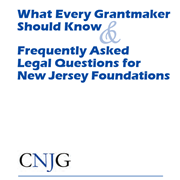Site Search
- resource provided by the Forum Network Knowledgebase.
Search Tip: Search with " " to find exact matches.

This guide was designed to help the state’s philanthropic community understand their ethical, legal, and fiduciary requirements and obligations.
Newark Philanthropic Liaison, Kevin Callaghan, was featured on an episode of Newark Today on WBGO...
Native Voices Rising is a joint research and re-granting project of Native Americans in Philanthropy and Common Counsel Foundation. This report focuses on the practices and challenges of community organizing...
...
Foundation leaders have a unique opportunity to serve as powerful champions of their missions. Partnering with your grantees can amplify your impact. The following guide is designed to help you start having an honest conversation in the boardroom; a...

Foundations Facilitate Diversity, Equity, and Inclusion: Partnering with Community and Nonprofits, a new report by the OMG Center for Collaborative...
Since 1998, Alliance Magazine has been the leading magazine for philanthropy and social investment worldwide providing news and analysis of what’s happening in the sector.
The...
